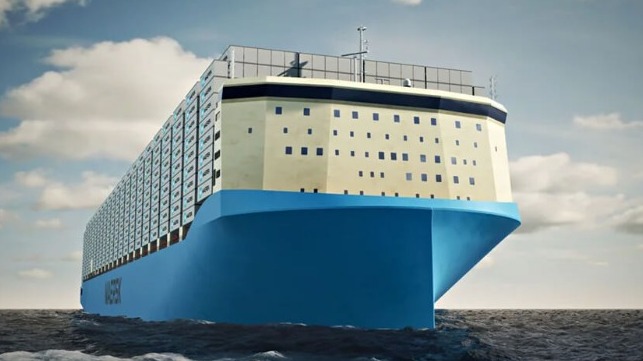Building Global Supply of Green Bio-Methanol for Maersk’s New Ships

Efforts are continuing to develop the global supply network for methanol and more specifically the environmentally-friendly green bio-methanol to support the transition of the shipping industry away from its traditional fossil fuels. Shipping giant Maersk is leading the efforts after saying that it feared there would not be a sufficient quantity of the gas fuel to support the operations of its new fleet of dual-fuel vessels due to start entering service in 2024 operating on methanol.
Maersk announced that it has signed a seventh methanol production partnership to join the global network of green methanol production it unveiled in March 2022. At the same time, European Energy, which was one of the first partners to join the network has also secured a supply of a key ingredient for the production of fuel that will be qualified as green bio-methanol.
Maersk contends that green methanol is the only market-ready and scalable available solution today for decarbonizing the shipping industry and that production must be increased through collaboration across the ecosystem and around the world.
Chinese bioenergy enterprise Debo joins the global network of companies that Maersk is working with to produce at least 730,000 tonnes of green methanol per year by end of 2025 needed for its first 12 green container vessels that are being built in South Korea. Geographically, Maersk has built a network of green methanol production in Asia, North America, and South America. The other companies that Maersk is working with are CIMC ENRIC, European Energy, Green Technology Bank, Orsted, Proman, and WasteFuel.
Maersk announced that it has signed a letter of intent covering Debo’s plans to develop a bio-methanol in China with a capacity of 200,000 tonnes per year that will start commercial operation in 2024. The feedstock for the green bio-methanol will be agricultural residues and Maersk intends to offtake the full volume produced.
A high-tech enterprise covering bioenergy technology research and development, production, sales, and operation, Debo has committed to the research and industrial application of biomass thermal conversion for more than 15 years with more than 100 biomass gasification projects built in China and abroad. The firm plans to expand on its experience in biomass gasification to synthesize green methanol, natural gas, hydrogen, and aviation kerosene production and has established a complete intellectual property protection system.
“Maersk has set an ambitious end-to-end net-zero goal for 2040 and the availability of green methanol at scale is critical to our fleet’s transition to sustainable energy,” said Berit Hinnemann, A.P. Moller - Maersk Head of Green Fuels Sourcing. “Partnerships across ecosystems and geographies are essential for the scale-up needed in order to make meaningful progress on this agenda already in this decade.”
European Energy, which was one of the first companies to join the global network has also taken a key step to develop the supply chain for the needed components for its planned production. The company, which committed to the annual production of between 200,000 and 300,000 tonnes of methanol by the end of 2025, has signed an agreement with Canadian-based Anaergia for a supply of up to 60,000 tonnes per year for 10 years of liquefied biogenic Carbon Dioxide. Anaergia will provide the liquified CO2 from the anaerobic digesters that will operate at its plant being built in Tønder, Denmark, and has agreed to build a state-of-the-art CO2 liquification system at the plant for the supply to European Energy.
European Energy will use the materials supplied by Anaergia to produce green e-methanol to fuel Maersk’s ship from this biogenic CO2. The companies explained that biogenic carbon dioxide is carbon dioxide that is released during the decomposition of organic matter such as food waste. Biogenic carbon dioxide that comes from organic material is considered a desirable raw material for low-carbon fuels as its use does not add new carbon to our atmosphere. As part of its gas processing operation to create renewable natural gas, Anaergia normally returns to the atmosphere a clean stream of carbon dioxide. The company cites the agreement with European Energy as an example of carbon capture and utilization, a critical step on the path toward net zero.
“The benefit for us is the ability to sell the biogenic CO2 from our plants that is produced when we convert organic materials to methane and CO2,” said Andrew Benedek, Chairman and CEO of Anaergia. “By selling this CO2 instead of returning it to the atmosphere, our plants contribute to de-carbonizing hard-to-abate sectors, such as shipping, while becoming more profitable, as we turn this waste gas from our plants into a useful fuel.”
Maersk will debut the series of pioneering 16,000 TEU container vessels that will be powered by carbon-neutral methanol in 2024. The first series of eight boxships that are being built by Hyundai Heavy Industries will be approximately 1,148 feet long and according to the company will allow for a 20 percent improvement in energy efficiency per transported container compared to the industry average for vessels of the same size. The ships are seen as the beginning of a new sector for the industry as smaller carriers including X-Press Feeders has also turned to methanol and it was recently reported that CMA CGM was hedging its focus on LNG-fueled ships also placing an order for ships capable of using methanol.
